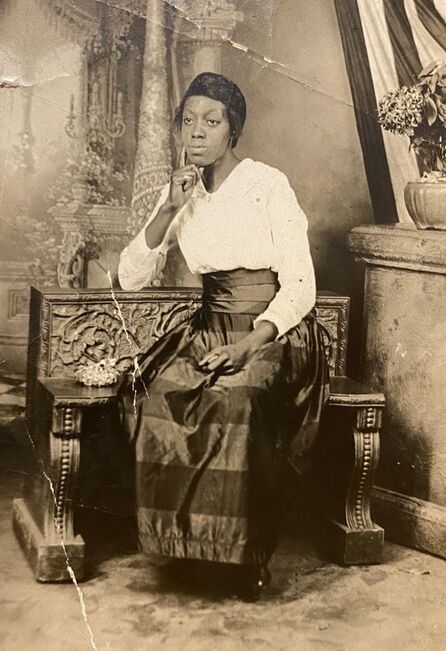 Katie Carter, the younger sister of George Carter and the grandmother of Jim Bannister. George Carter was lynched in Paris, Ky., in 1901. Photo provided by Jim's daughter, Cheryl. Katie Carter, the younger sister of George Carter and the grandmother of Jim Bannister. George Carter was lynched in Paris, Ky., in 1901. Photo provided by Jim's daughter, Cheryl. On February 23, 1900, Rep. George Henry White (R-N.C.), the sole Black U.S. lawmaker at the time, gave an impassioned speech on the House floor about the antilynching legislation he was proposing. The bill would make mob violence that resulted in the victim’s death a federal crime of treason to be tried in U.S. courts. White had felt compelled to act after witnessing the bloody Wilmington, N.C., race riot a little over a year before, during which a mob of white locals toppled the city’s multiracial government and ruthlessly murdered an estimated 60 innocent Black citizens. After White’s speech, his fellow congressmen applauded his words but failed to pass the bill out of committee. Thirty-five years after the Civil War, Southern devotion to states’ rights was still paramount. White called out some of his colleagues who had spoken against heinous lynchings in their own communities. In White’s view, these legislators would not countenance federal legislation because “this would not have accomplished the purpose of riveting public sentiment upon every colored man of the South as a rapist from whose brutal assaults every white woman must be protected.” [Washington Post, February 21, 2020] A year later, on February 11, 1901, a determined mob of local townsmen hung George Carter in front of the Bourbon County Courthouse in Paris, Ky. His crime? According to news reports: an attempted purse snatching. According to rumor and innuendo: rape.  My great-grandmother, Mary Lake Barnes Board. My great-grandmother, Mary Lake Barnes Board. The woman George Carter allegedly accosted was my great-grandmother, Mary Lake Board. The eight-year-old boy who identified Carter as his mother’s assailant was my maternal grandfather, William Lyons Board. There are reasons to question whether George Carter was indeed the man who assaulted my great-grandmother. There was no trial, no presentation of evidence. There was almost certainly no capital crime. In her book In the Courthouse’s Shadow: The Lynching of George Carter in Paris, Kentucky, Paris native Tessa Bishop Hoggard scrutinizes the contemporaneous documentation and then offers a riveting account of the lead-up to the encounter with my great-grandmother and its chilling aftermath. The hanging also plays a pivotal role in the novel I wrote about my grandfather, Next Train Out. Of course, no one in that Paris, Ky., mob was ever identified or arrested. No one was charged or convicted of murdering George Carter. There was no federal hate crime or antilynching law on the books, because Congress had failed to act the year before. It was not until 1920 that “Kentucky became the first southern state to pass an antilynching law.” [John D. Wright Jr., “Lexington’s Suppression of the 1920 Will Lockett Lynch Mob,” The Register of the Kentucky Historical Society 84, no. 3 (1986): 263-79.] This month, 122 years later, after 200 failed attempts, Congress finally succeeded in passing the Emmett Till Antilynching Act, named in honor of the 14-year-old boy who was lynched in Mississippi in 1955. After President Biden signs the bill into law, a lynching resulting in death or serious bodily injury can be prosecuted as a federal hate crime punishable by up to 30 years in prison. It’s too late for George Carter, of course, or for the estimated 2,000 people who were lynched in this country after White’s original bill failed. But perhaps it’s a sign that our nation’s citizens are finally ready to take some initial steps toward ensuring justice prevails when racial hate crimes are committed. Just last month a Georgia jury found the three white men involved in Ahmaud Arbery’s murder guilty of federal hate crimes. The next day the three Minneapolis police officers who remained inert as Derek Chauvin slowly killed George Floyd were all found guilty of violating Floyd’s civil rights. It may feel like way too little way too late, but perhaps we can sense a slight rebalancing of the scales of justice. Perhaps we are moving at a snail’s pace toward that more perfect union where all men and women truly are created equal. Despite current efforts in statehouses across the country to restrict discussions of our nation’s documented history relating to racial injustice and oppression, perhaps these concrete actions are signs of movement in the opposite direction, toward transparency and a more honest reckoning of our past. We all need to feel uncomfortable about the atrocities that have been committed in this nation to buttress unequal power structures. We need to feel shame. And then we need to take action to address the lingering institutions and sentiments that perpetuate these injustices. Rep. Bobby Rush, D-Ill, the longtime champion of the Emmett Till Antilynching Act, said after the bill passed: “Lynching is a longstanding and uniquely American weapon of racial terror that has for decades been used to maintain the white hierarchy…. [This bill] sends a clear and emphatic message that our nation will no longer ignore this shameful chapter of our history and that the full force of the U.S. federal government will always be brought to bear against those who commit this heinous act.” [NPR, March 7, 2022] Bill signedOn Tuesday, March 29, 2022, President Biden signed into law the Emmett Till Antilynching Act. Till’s cousin, Rev. Wheeler Parker Jr., the last living witness to his abduction, said in response, “Laws make you behave better, but they cannot legislate the heart.” Let’s hope the hearts of all Americans are slowly recognizing the injustices that have stained our nation since its inception. eventOn Saturday, March 26, 2022, Tessa Bishop Hoggard and I participated in a Zoom virtual conversation hosted by the Paris, Ky., Hopewell Museum. We discussed the 1901 lynching of George Carter and how that dark episode prompted both of us to write our books. Connecting with Tessa ultimately led to my friendship with George Carter’s great-nephew, Jim Bannister.
4 Comments
HANNAH J HELM
3/21/2022 11:20:19 am
I continue to be appalled by what I've read in the last couple of years since the Black Lives Matter movement has helped raise awareness of the atrocities of the past. I'm equally appalled that too many want to sweep these incidents under the rug and not be reminded. How has it taken so many years for this law too pass. Thank you Sally for noting this important law.
Reply
Elizabeth Eklund
3/21/2022 11:31:39 am
I have notified my brothers of the upcoming Zoom event and look forward to seeing you then/there. Thanks so much for your excellent work on the family history and that of our country.
Reply
Vince Fallis
3/21/2022 12:42:38 pm
That it took until 2022 to pass the anti lynching act is enough of a disgrace. But not wanting to be one upped in that regard was the no vote by our upstanding congressman Thomas Massie. But should we be surprised? His Christmas Card was a photo of his entire family with each displaying a firearm. Absent from the card was any message of the Christ Child or Peace on Earth, Good will toward men. When the socializing institutions in a society become non functional, what prevents the expressions of the worst instincts of its inhabitants. As the answer is "nothing", we are left with the call to arms and our feckless lawmakers who enable, support and embrace it.. My mother would often say "This world is not my home". She passed in 1975. What would she say now?.
Reply
Tessa Hoggard
3/21/2022 06:45:17 pm
Thanks for this excellent message. It's been a long and slow process to rebalance the justice scale. May those lessons from our history continue to illuminate our path to the future and to avert regression to the shameful yesterdays.
Reply
Your comment will be posted after it is approved.
Leave a Reply. |
Details
Archives
June 2023
Categories
All
|


 RSS Feed
RSS Feed